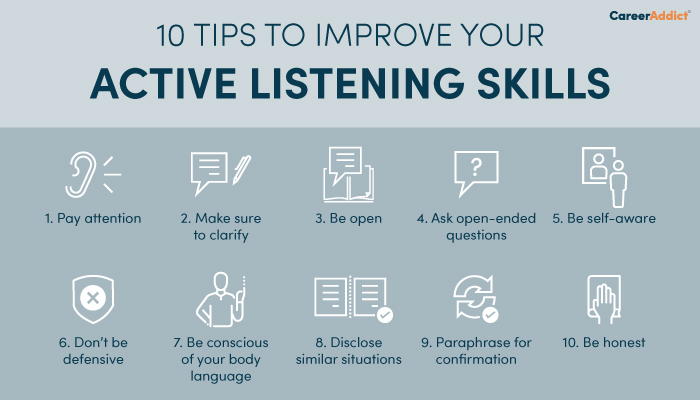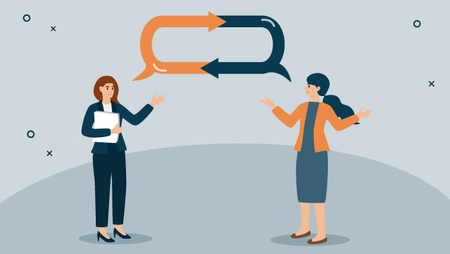Over the years, you might have noticed many of your colleagues embrace two types of communication skills: talking all the time and hardly listening to what you are saying. Unfortunately, there is no happy middle for your co-workers, which might not be the best thing when it comes to workplace communication.
But is there even somewhere in the middle when it comes to speaking and listening? Yes, it is called active listening. This might seem like a foreign concept in the modern world where too many people are self-absorbed and only enjoy hearing the sound of their own voice. Or, considering the latest changes, active listening could be completely alien since up to 74% of us communicate remotely following the Covid-19 pandemic.
So, what is active listening? And can you develop active listening skills? We have compiled a guide to answering these questions so you can add to your professional skillset.
What are active listening skills?
In this day and age, too many people are passive listeners, ready to interrupt and provide their own two cents at any moment, without considering what the person on the other side is saying. Active listening is the opposite, because it is about giving your full attention to the person you are communicating with and utilizing all your senses to show that you are engaged.
Indeed, active listening is about paying attention and fully comprehending what the other individual is saying. Whether it is about a project or something he or she achieved at the office on a particular day. This is a terrific way to improve teamwork, too.
Put simply, by active listening, you are securing the information that the person is conveying to you.
The importance of active listening skills
Good communication is a must in your professional endeavors, as well as your personal life. This goes beyond just nodding your head anytime someone speaks to you. With plenty of active listening skills, you can avoid misunderstandings, ensure there is lots of recognition, and a better understanding of viewpoints.
Ultimately, active listening can lead to a more positive and happy work environment because it produces empathy, resolves common office conflicts, and builds trust and rapport. Oftentimes, it would be prudent to remember why we listen; to attain information, understand the information, enjoy conversing and learn something. As the saying goes, we have two ears and one mouth for a reason.
Tips for improving your active listening skills
So, now that you understand the importance of active listening, what tips can you employ to enhance your skills for the future? We have put together a list of ten things you could do to improve communication at work, so make sure to consider these tips moving forward.

1. Pay attention
This might be common sense, and you may think that you are paying attention, but you might be taken aback when you try to recollect your conversation, and you are missing big chunks of what the person said. Active listening requires paying close attention to what people are saying to you, consisting of focusing on the present, making regular eye contact, and allowing a "wait time" before issuing a response. This can go a long way toward becoming a superior active listener.
2. Make sure to clarify
If you missed something your friend or colleague said, there is nothing wrong with requesting clarification. This does not mean you were not paying attention or are indifferent to what he or she was saying. In fact, it’s the opposite, because it shows you are engaged and interested. So, you could say something like, "Just to be clear" or "Are you talking about [topic]?"
This also prevents cases of miscommunication at work, as you’re checking the information you have is correct before proceeding.
3. Be open
Be it a discussion over how an assignment should be completed or a conversation as to why a certain employee was fired, it is also crucial to maintain an open mind when you are talking. This is of the utmost importance since you always need to understand someone else's point of view when you are improving your communication and interpersonal skills. You can accomplish this by not interrupting, letting the other person finish, and withholding any criticisms until it is your turn to talk. This gives you a chance to better process the information.
4. Ask open-ended questions
"What do you think about that?" or "What was their response?" are some of the different open-ended questions you could ask throughout your conversation. Like clarification, the open-ended inquiry can accomplish various objectives in your quest to be the best active listener, especially trying to show that you are interested.
5. Be self-aware
Improving your self-awareness will help you become happier and more productive at work, but it also helps you to communicate better, too. Have you ever thought about how you communicate? Doing some introspection of how you to talk to others can go a long way to being a better listener.
Whether it is talking incessantly or repeating the same information over and over again, you likely possess multiple aspects of communication that can make it challenging to speak to you. That said, by grasping your personal type of communication, you could potentially use these as examples to resolve your own listening issues.
6. Don’t be defensive
A common problem in a competitive workplace is that, particularly when people are trying to one-up the other person, they prepare for a rebuttal. They are not listening to the other person finishing a thought or opinion, but rather coming up with a rebuttal. It is best to avoid this, since you might be missing out on pertinent information.
7. Be conscious of your body language
It is often said that 90 percent of communication is non-verbal, from your posture to your hand movements. We have many tells that might spotlight how we really feel about a conversation. That said, it is crucial to monitor your body language, like occasionally nodding, keeping a straight posture and smiling when the moment calls for it. Likewise, please pay attention to the other person's body language to ensure he or she is not giving off negative vibes.
8. Disclose similar situations
While you do not want to make a conversation all about you, you do want to showcase that you are listening by disclosing a relevant situation that happened to you. This emphasizes two things. The first is that it highlights your understanding. The second is that it shows you want to resolve the conflict together.
9. Paraphrase for confirmation
There is putting words in someone's mouth, and there is paraphrasing to confirm what he or she is saying. This is a typical go-to strategy when you want to engage in a conversation actively and better understand what is being shared by that person. The tactic also demonstrates any concerns you may have and manufactures a sense of empathy.
10. Be honest
Do you think lying or telling the other person what you think they want to hear is the best way to actively communicate? Most certainly not. In fact, the greatest method you could utilize is being candid in your opinions. Of course, you can still respectfully express yourself, but it’s best to be honest and respectful.
Final thoughts
Let's be honest, most people like to talk and talk ... and talk. This should be exploited to your advantage through the means of active listening. This can change both your professional and personal life for the better since it is a soft skill that’s desperately needed.
By focusing more on your listening and communication skills, many will consider you the most incredible communicator they know, since you’ll be adopting the best of both worlds: listening at all times and talking when necessary.
After a week of embracing active listening, you will notice stark changes in people who wish to engage with you, be it for a beer after work or during important work meetings.
Are you working on becoming a better active listener? What changes have you noticed since you began improving your communication? Let us know in the comments!


